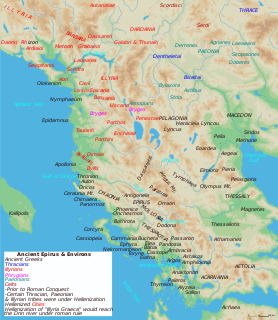Chrysothemis or Khrysothemis, is a name ascribed to several characters in Greek mythology.

Brasidas was the most distinguished Spartan officer during the first decade of the Peloponnesian War.
Agis II was the 18th Eurypontid king of Sparta, the eldest son of Archidamus II by his first wife, and half-brother of Agesilaus II. He ruled with his Agiad co-monarch Pausanias.
Hippocrates was the father of Peisistratos, the tyrant of Athens. According to Herodotus, he received an omen when he was at Olympia to see the Olympic games. Vessels filled with meat and water spontaneously boiled over after he offered the sacrifice, though the vessels were not placed over fire. Chilon the Lacedaemonian (one of the Seven Sages of Greece} advised him that he should disown his son, or if he did not have one, send his wife away, or else if he was not married, not to marry a wife who could bear children. Hippocrates ignored his advice. Hippocrates claimed to be descended from the Homeric chief and legendary King of Pylos, Nestor.
Acestor was the name of several figures in Classical mythology and history:
Aeantides is the name of several people in Classical antiquity:

Admetus was a Greek king of the Molossians at the time that Themistocles was the effective ruler of Athens. When Themistocles was in control of Athens, Admetus had opposed him, but without any rancour.
Agatharchus or Agatharch of Syracuse was a Syracusan who was placed by the Syracusans over a fleet of twelve ships in 413 BC, to visit their allies and harass the Athenians. He was afterwards, in the same year, one of the Syracusan commanders in the decisive battle fought in the city's harbor during the Battle of Syracuse.
Agesipolis III was the 31st and last of the kings of the Agiad dynasty in ancient Sparta.
Agriopas was a writer of ancient Greece mentioned by Pliny the Elder. He was the author of an account of the Olympic victors, called the Olympionicae. His exact date is unknown.
Sthenelaidas was a Spartan who held the office of ephor in 432 BC, and, in the congress of the Lacedaemonians and their allies at Sparta in that year, vehemently and successfully urged the assembly to declare war with Athens. The speech which Thucydides puts into his mouth on this occasion is strongly marked by the characteristics of Spartan eloquence: brevity and simplicity. He was the father of the Spartan general Alcamenes.
Endius (Endios) was a Spartan ephor during the Peloponnesian War.
Alexarchus or Alexarch of Corinth was an ancient Greek general who, while the Lacedaemonians were fortifying Deceleia in Attica in 413 BC, and were sending an expedition to Sicily, was entrusted with the command of 600 hoplites, with whom he joined the Sicilian expedition.
Alexicles was an Athenian general who belonged to the oligarchial or Lacedaemonian party at Athens. After the revolution of 411 BC, he and several of his friends left the city and went to their friends at Decelea. But he was afterwards made prisoner in Piraeus, and sentenced to death for his participation in the guilt of Phrynichus.

Alyzeia or Alyzia (Ἀλυζια), was a town on the west coast of ancient Acarnania. According to Strabo it was distant 15 stadia from the sea, on which it possessed a harbour and a sanctuary, both dedicated to Heracles. In this sanctuary were some works of art by Lysippus, representing the Labours of Heracles, which a Roman general caused to be removed to Rome on account of the deserted state of the place. The remains of Alyzia are still visible in the valley of Kandili. The distance of the bay of Kandili from the ruins to Leucas corresponds with the 120 stadia which Cicero assigns for the distance between Alyzia and Leucas. Alyzia is said to have derived its name from Alyzeus, a son of Icarius. It is first mentioned by Thucydides; in 375 BCE, a naval battle was fought in the neighbourhood of Alyzia between the Athenians under Timotheus and the Lacedaemonians under Nicolochus. The Athenians, says Xenophon, erected their trophy at Alyzia, and the Lacedaemonians in the nearest islands. We learn from the Periplus of Pseudo-Scylax that the island immediately opposite Alyzia was called Carnus, the modern Kalamos.
Alypus was a sculptor of ancient Greece, a native of Sicyon. He studied under Naucydes of Argos. His age may be fixed from his having executed bronze statues of some Spartans who shared in the victory of Lysander at Aegospotami around 405 BC. Pausanias also mentions some statues of victors of the Ancient Olympic Games made by him.
Pythagoras of Laconia was an ancient Greek athlete listed by Eusebius of Caesarea as a victor in the stadion race of the 16th Olympiad.
Aneristus, the son of Sperthias, a Lacedaemonian ambassador, and grandson of Aneristus, was a figure in the Peloponnesian War. He was sent at the beginning of the war, around 430 BCE, to solicit the aid of the king of Persia. He was surrendered by the Athenians, together with the other ambassadors who accompanied him, by Sadocus, son of Sitalces, king of Thrace, taken to Athens, and there put to death.
Nicodamus was a sculptor from Maenalus in Arcadia, who made statues of the Olympic victors Androsthenes, Antiochus of Arcadia, and Damoxenidas; one of the goddess Athena, in bronze and carrying her helmet and aegis, dedicated by the Eleans; and one of Hercules, as a youth, killing the Nemean lion with his arrows, dedicated at Olympia by Hippotion of Tarentum.






